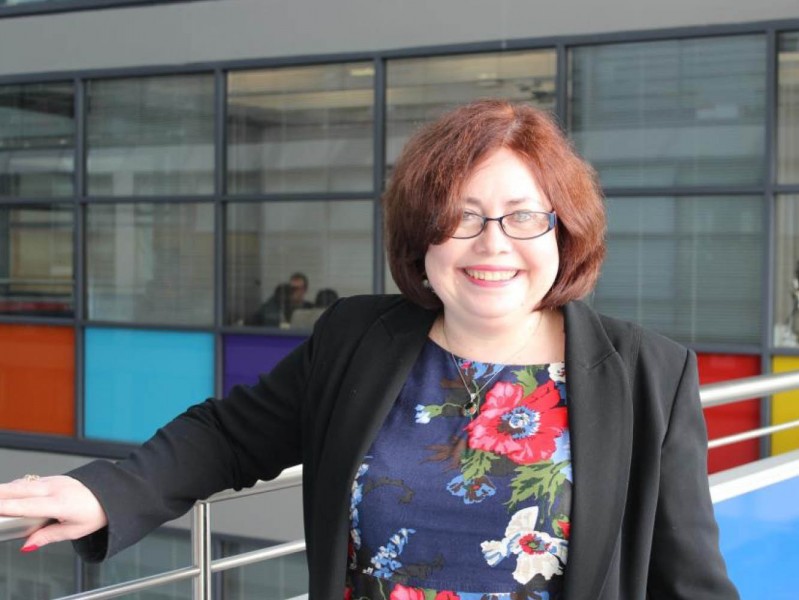Opinion Piece - Working towards a gender-equal world
Thursday 12 March 2020

On International Women’s Day, we celebrate the achievements of women and girls and also come together to advocate for further change.
At Robert Gordon University last week, the university’s Women’s Network arranged a number of well-attended events to celebrate International Women’s Day – which is celebrated each year on 8 March. These included a menopause café, offering a safe space for discussion between women staff members; a roundtable with women vice-principals, who shared their career journeys; and an “In Conversation” event with award-winning Holyrood editor Mandy Rhodes. This event was open to the public and jointly organised with the Rise Up Quines! festival.
Mandy Rhodes has worked in journalism in Scotland for more than thirty years and has won numerous awards, including PPA Magazine Editor of the Year, Feature Writer of the Year and Columnist of the Year. I very much enjoyed talking to Mandy about her career in political journalism and the changes she has seen in both the press and politics as far as women are concerned. We talked about some of her big interviews with politicians such as Nicola Sturgeon, and discussed how social media has changed the political landscape in recent years. Mandy was particularly thoughtful in discussing how she deals with reporting negative news stories about politicians that she has grown to know very well over her years at Holyrood. We also touched on some of the more contentious issues in Scotland at the moment, such as the government’s planned reforms to the Gender Recognition Act, which stimulated a good amount of discussion amongst the audience afterwards.
International Women’s Day has been around for over a hundred years, with roots in the campaign for socialist revolution before the First World War. In 1910, a Socialist International Women’s Conference in Copenhagen called for a Women’s Day to honour the movement for women’s rights. The next year, over a million men and women in Austria, Denmark, Germany and Switzerland attended rallies calling for equal rights, the vote for women and the right to hold public office. During the First World War, women used the day to campaign for peace between the warring nations, and in 1917 women in Russia used the day to strike for ‘Bread and Peace’. Four days later, the Tsar abdicated and the new provisional government granted women the right to vote.
International Women’s Day was designated a national holiday in many Communist countries, but it was not until the 1970s and the second wave of feminism that it became popular in countries in the West. 1975 was International Women’s Year and it was then that the United Nations designated 8 March as an official UN observance. In many countries it is a national holiday, although in Madagascar that holiday is only for women!
In recent years in the UK the day has become intertwined with corporate sponsorship, with particular themes for each year. For the UN, this year’s theme is I am Generation Equality: Realizing Women’s Rights, but you will also see the hashtag #eachforequal, which calls on each person to consider how they can work with others to achieve a gender-equal world.
When thinking about celebrating women in Aberdeen, a good place to start is the mural produced by ceramicist Carrie Reichardt for the NuArt Festival in 2018, which can still be visited on St Nicholas Street. The mural features women from Aberdeen’s past and present, including the Vice-President of the British Medical Association Mary Esslemont, naturalist and campaigner Marian Farquharson and Ishbel, Lady Aberdeen. More modern faces include musicians Emeli Sandé and Annie Lenox. The mural also features several of Aberdeen’s suffrage campaigners, including suffragettes Una Duval and Caroline Phillips and suffragist Louisa Innes Lumsden. Many of the women featured worked to advance women’s equality in their particular fields. Marian Farquharson, for example, fought for years to get the Linnean Society for naturalists to admit women to its ranks. When the Society did agree to allow women to join, a ballot was held with fifteen women’s names included – fourteen were accepted into the society, but Marian was blackballed. In the last few years the achievements of the suffrage campaigners of Aberdeen have been further recognised by the unveiling of plaques on Union Street for both Caroline Phillips and Louisa Innes Lumsden.
It is important to celebrate the achievements of women and girls on International Women’s Day – but also to ask ourselves how we can continue to work together to achieve a gender-equal world.
And before you ask, International Men’s Day is on 19 November.
